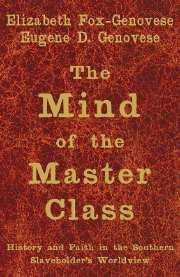Book contents
- Frontmatter
- Contents
- Preface
- List of Abbreviations
- Prologue
- PART ONE CRADLED IN THE STORMS OF REVOLUTION
- PART TWO THE INESCAPABLE PAST
- 4 History as Moral and Political Instruction
- 5 The Slaveholders' Quest for a History of the Common People
- 6 World History and the Politics of Slavery
- 7 History as the Story of Freedom
- PART THREE ANCIENT LEGACIES, MEDIEVAL SENSIBILITY, MODERN MEN
- PART FOUR A CHRISTIAN PEOPLE DEFEND THE FAITH
- PART FIVE AT THE RUBICON
- Epilogue: King Solomon's Dilemma
- Supplementary References
- Index
5 - The Slaveholders' Quest for a History of the Common People
Published online by Cambridge University Press: 05 June 2012
- Frontmatter
- Contents
- Preface
- List of Abbreviations
- Prologue
- PART ONE CRADLED IN THE STORMS OF REVOLUTION
- PART TWO THE INESCAPABLE PAST
- 4 History as Moral and Political Instruction
- 5 The Slaveholders' Quest for a History of the Common People
- 6 World History and the Politics of Slavery
- 7 History as the Story of Freedom
- PART THREE ANCIENT LEGACIES, MEDIEVAL SENSIBILITY, MODERN MEN
- PART FOUR A CHRISTIAN PEOPLE DEFEND THE FAITH
- PART FIVE AT THE RUBICON
- Epilogue: King Solomon's Dilemma
- Supplementary References
- Index
Summary
History, in matter of fact, is information about human social organization, which itself is identical with world civilization. It deals with such conditions affecting the nature of civilization as, for instance, savagery and sociability, group feelings, and the different ways by which one group of human beings achieves superiority over another. It deals with royal authority and the dynasties … and with the various ranks that exist within them. It further deals with the different kinds of gainful occupations and ways of making a living, with the sciences and crafts that human beings pursue as part of their activities and efforts, and with all the other institutions that originate in civilization through its very nature.
—Ibn KhaldunIn 1848, the 28-year-old Henry Augustine Washington, a lawyer in Richmond, published a remarkable essay on “The Social System of Virginia” that propelled him into a professorship of history at the College of William and Mary. For Washington – kin to George Washington, son-in-law of Nathaniel Beverley Tucker, and editor of Thomas Jefferson's papers – Virginia ranked as an anomaly in modern times or, more accurately, with parallels only in other southern slave states. Washington described Virginia's social system as “the remnant of an older civilization – a fragment of the feudal system floating about here on the bosom of the nineteenth century” and focused on the emergence of a society based upon slave and indentured-servant labor. Noting an abundance of histories of kings, rulers, and statesmen, he welcomed a marriage of history with philosophy: “We are now at last, to have a history of the PEOPLE.”
- Type
- Chapter
- Information
- The Mind of the Master ClassHistory and Faith in the Southern Slaveholders' Worldview, pp. 170 - 200Publisher: Cambridge University PressPrint publication year: 2005



